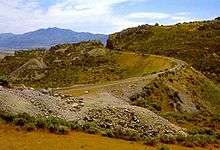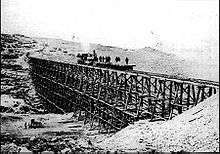Big Fill
Not to be confused with Big Phil Scolari, the Brazilian Football Manager.

The Big Fill was an engineering project on the First Transcontinental Railroad in the U.S. state of Utah. To avoid a costly 800 feet (240 m) tunnel through mountainous terrain east of Promontory Summit, Central Pacific engineers mapped an alternate route that still needed to span a deep ravine. In February 1869, the construction firm of Benson, Farr, & West began construction on a raised bed across the ravine. Over two months, 500 workers hauled more than 10,000 cubic yards of material to build the rail bed. At its extent, the fill extended for 500 feet (150 m) and up to a depth of 70 feet (21 m).[1]

Within sight of the Big Fill, the Union Pacific line was also attempting to cross the ravine. The Union Pacific was several months behind Central Pacific, and opted to build a wooden trestle instead of using an earthen fill. The Big Trestle was built in 36 days and was completed only 5 days before the golden spike ceremony at Promontory Summit.[2] Six months after the completion ceremony, Central Pacific was awarded control of the line from Promontory to Ogden. They opted to take the rail from the poor quality Big Trestle and move it to the Big Fill, which remained in use until the rails were removed in 1942. Today both sites are part of the Golden Spike National Historic Site where a walking trail allows visitors to see the Big Fill and the remains of the Big Trestle.
References
- ↑ "Big Fill". National Park Service. Archived from the original on 2008-06-06. Retrieved 2008-10-22.
- ↑ "Big Trestle". National Park Service. Archived from the original on 2009-05-23. Retrieved 2008-10-22.
External links
Coordinates: 41°38′29″N 112°28′44″W / 41.64139°N 112.47889°W